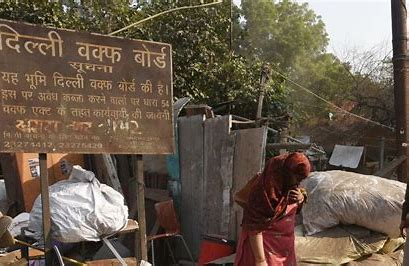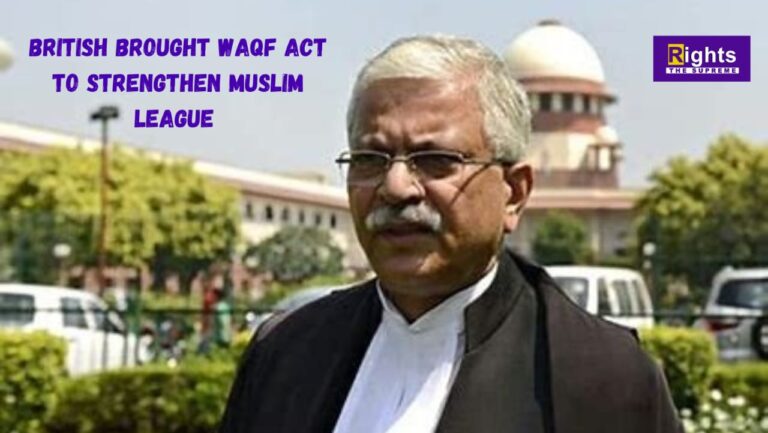Senior Advocate Rakesh Dwivedi has called for derecognising the grants of land made by Mughal invaders and conquerors, which are presently recognised under the Waqf Act, 1995. He has also said that the present Waqf law is not benign and that its history is cancerous.
The Senior Advocate was speaking in an exclusive interview given to Verdictum on the Waqf (Amendment) Bill, 2024.
“Unfortunately even after independence, we have continued to recognise the grants of land by the Sultans and the Mughal Badshas and their governors and Nawabs. The result is that those forces which had invaded India and occupied India for a long period, they actually did not own the land, which is our territory. They subjugated the people of India and they took advantage of the land which did not belong to them. Waqf can be created by somebody out of his own property. I can create a Waqf with regard to my movable and immovable property and dedicate it to God for religious and charitable purposes. But I cannot forcibly occupy somebody else’s land and then create a Waqf on that. That grant is recognised by these Acts”, Rakesh Dwivedi said.
“Today Waqf is the third largest landholder in India, after Defence and Railways. This is a very serious matter on which the Parliamentarians should give serious consideration. It is time that we derecognise the grants which have been made by the conquerors, the erstwhile invaders. This land was never theirs. So why should we recognise their grants?”, he added.
He added that the grants can be undone by the government. “The government is the owner of that land, the grant can be undone”. He referred to a recent judgment of the Supreme Court and said, “So there is very clear law now that the government can nullify these grants. And that is not anti-Muslim either, because Muslims are free to create Waqfs out of their own property. So if any Muslim in India wants to do that, he is free to do it. No problem. It is consistent with their religion. But there is no question of banking on any grants made by the erstwhile Badshas and Sultanas, Nizams and Nawabs”.
The Senior Advocate also said it is a problem that there are common lands of villages and evacuee property with respect to which Waqf has been recognised.
Speaking about the origins of Waqf laws in India, Dwivedi said, “So Waqf otherwise also has created a lot of problems during the freedom struggle and we find that the British government had brought in all these Waqf Acts with a view to creating an alliance with Muslim League, to build up Muslim League, to create its strength. Especially after the Government of India Act 1937, the Muslim League did not do well in the elections. Then we find that Orissa Waqf Act was created, Bombay Waqf Act was created, Bengal Waqf Act was created in 1934 to 1936 and the Sharia Act was imposed in 1937. So this was all done, and we see that Lahore Resolution came in 1940 and that all led to partition”.
He continued, “So Waqf is not such a benign kind of a thing. Although, under the Constitution, it should be benign. But its history is cancerous. In the name of Waqfs there have been conversions, in the name of Waqfs there has been partition of India. The whole effort was to create unity among the Muslims behind the Muslim League”.
He said that it is a very serious problem and called upon the members of the Joint Parliamentary Committee (JPC) and the Parliamentarians to include a specific provision to undo the land grants of the Mughal rulers. The JPC is in the process of public consultation with respect to the Waqf (Amendment) Bill, 2024.
While answering a question comparing the laws for Hindu religious endowments and the Waqf Act, he said that while the Waqf Act confers more autonomy and power to the community, the Hindu endowment laws are intrusive, with complete control given to the state governments. He said that lack of similar autonomy when it comes to Hindu Temples and religious endowments amounts to “hostile discrimination” and a violation of Article 14 of the Constitution.
Origin and History of Waqf in India and Its Recent Amendment
The Indian Government is planning to make significant amendments to the Waqf Board Act of 1995. Despite Muslims in India being the third largest landholders after the Railways and Armed Forces, their situation remains unsatisfactory.
What is Waqf and Waqif?
Waqf refers to the act of detaining, confining, and prohibiting the sale or use of a property. In Islamic terms, it denotes a property reserved exclusively for religious or charitable purposes, with any other utilization or sale being forbidden.
According to Sharia law, once a property is dedicated to Waqf, it remains Waqf property indefinitely. The ownership is considered to be transferred from the person making the Waqf to Allah, with the asset being used solely for charitable purposes. Waqif is the person who creates a Waqf for the help of others, typically for religious or charitable purposes. A Mutawalli is appointed by the Waqif to manage the Waqf.
The start of the Waqf Concept in Islam
The concept of Waqf is not directly mentioned in the Quran but can be derived from Surah-Al-i-Imran (3:92): “You will never achieve righteousness until you donate some of what you cherish, and whatever you give is certainly well known to Allah.”
The first recorded Waqf during Prophet Muhammad’s time consisted of a grove of 600 date palms. A Jewish man, Mukhairiq, bequeathed his seven orchards in Medina to Prophet Muhammad, who dedicated them as a charitable Waqf to feed the needy in Medina.
Another incident involved Umar Ibn Al-Khattab, who, after acquiring land in Khaybar, was advised by the Prophet to make the land inalienable and donate its profits to charity.
The concept of Waqf was further emphasized by the Prophet, who stated that when a man dies, only three deeds continue to help him: continuity of alms, beneficial knowledge, and a pious child who prays for him.
History of Waqf in India
The concept of Waqf in India began during the early medieval period of the Delhi Sultanate, when Sultan Muizuddin Sam Ghaor allocated two villages to a Waqf for the Jama Masjid of Multan. The practice of Waqf became more entrenched due to the influence of Muslim rulers in the country.
In the late 19th century, a four-judge panel from England attempted to abolish Waqfs in India, calling it the “Perpetuity of the worst and most pernicious kind.” However, the Mussalman Waqf Validating Act of 1913 preserved the institution of Waqf in India.
In 1995, following the demolition of the Babri Mosque in 1991, Prime Minister P.V. Narasimha Rao made changes to the Waqf Board Act, giving Waqf boards unlimited rights to acquire land.
Waqf Act of 1954
The Waqf Act of 1954 was enacted by the Government of India to provide better administration and supervision of Waqfs in the country. The Act aimed to bring order and uniformity to the management of Waqfs and established Waqf boards at the state and district levels to manage and supervise Waqfs. It required the registration of Waqfs with Waqf boards, which maintained a register of all Waqfs in the state.
Waqf Act of 1995
The Waqf Act of 1995 was introduced to provide better administration and management of Waqfs and Waqf property. It established the Central Waqf Council and State Waqf Boards to ensure proper administration, maintenance, and control of Waqfs.
Central Waqf Council
- Established under Section 9 of the Act, the Central Waqf Council is authorized to provide guidance to state Waqf boards on finances, performance, and maintenance of Waqf deeds.
- The Council advises the central and state governments on Waqf management issues.
State Waqf Boards
- Established under Section 13 of the Act, with separate boards for the Shia and Sunni schools of Muslim law.
- The Boards consist of a chairman who is a respected scholar in Shia or Sunni theology, a Muslim officer from the state government, and two elected members of the electoral college.
Section 40 of the Waqf Act of 1995
Section 40 of the Act is one of its most controversial aspects, as it grants the Waqf Board full power to designate any property as Waqf property. The Board can determine whether a particular property should be classified as Waqf, Shia Waqf, or Sunni Waqf.
Disputes regarding the Board’s assertion of ownership over an individual’s property are settled in the Waqf Board Tribunal, with no option for further appeal to higher courts.

Structure of Waqf Board
The Waqf Board is a legal entity with nominated members responsible for managing Waqf properties.
The Central Waqf Council, established in 1964, oversees and advises state-level Waqf boards across India. The Union Minister in charge of Waqf is the ex officio chairperson of the Council.
Composition of a Tribunal by the Waqf Board
Section 83 of the Waqf Board Act of 1995 mandates the constitution of a Tribunal, which is deemed to be a civil court with all the powers and functions exercised by a civil court under the CPC, 1908.

Cases Related to the Illegal Claim of Land by the Waqf Board
There have been numerous cases of illegal land claims by the Waqf Board, such as the Tamil Nadu and Dwarka cases. In these cases, the Waqf Board claimed ownership of lands with little or no evidence, causing significant legal disputes and public outcry.
Waqf Amendment Bill 2024
The Waqf Amendment Bill of 2024 introduces several key changes:
- Unified Waqf Management: The amendment aims to retitle the 1995 Waqf Act as the Unified Waqf Management, Empowerment, Efficiency, and Development Act.
- Mandatory Registration: It mandates the registration of Waqf property with the district collector’s office for proper evaluation.
- Government Properties: Government properties designated as Waqf property will cease to be considered as such under this amendment.
- Judicial Recourse: Disputes with the Waqf Board Tribunal can now be appealed in the High Court or Supreme Court.
- Women’s Representation: Women will have representation in the Central Waqf Council and State Waqf Boards.
- Property Disputes: Disputed or suspected properties will not be classified as Waqf property until a final verdict is provided by the District Collector.
Waqf Boards in Other Countries
India’s Waqf Board system is unique, with no comparable systems in other countries like Turkey, Iraq, Jordan, Syria, and Lebanon. In India, the Waqf Boards are the third-largest landowners, trailing only the Military and Railways.
Impact of the Amendment
The Waqf Amendment Bill of 2024 will have a significant impact across India:
- Revocation of Autonomy: The autonomy of the Waqf Board will be reduced.
- Appeals and Accountability: Individuals will now have the option to appeal against Waqf Board decisions in higher courts.
- Women’s Representation: The inclusion of women marks a progressive step.
- Prevention of Unauthorized Claims: The amendment aims to prevent unauthorized land claims by the Waqf Board.
Is It Beneficial for India to Have a Waqf Board?
Establishing institutions for religious endowments can be beneficial, reducing the financial burden on the government and allowing resources to be reallocated to other developmental projects.
However, granting excessive powers to such institutions can lead to constitutional violations and concerns about secularism. Unlike the Waqf Board, there is no centralized authority overseeing Hindu religious endowments, highlighting a disparity that needs to be addressed.
Editor’s Note
India should establish religious endowment institutions that ensure a fair distribution of resources among different religions. The government should create centralized endowment boards for all religions, enforcing strict oversight and regulations.
The primary objective behind amending the Waqf Act of 1995 is to enhance transparency and accountability. The new Waqf Amendment Bill aims to reduce the autonomy of the Waqf Board, promote women’s participation in the State Waqf Boards, and subject their decisions to judicial scrutiny, creating a more balanced and fair system for all citizens.

